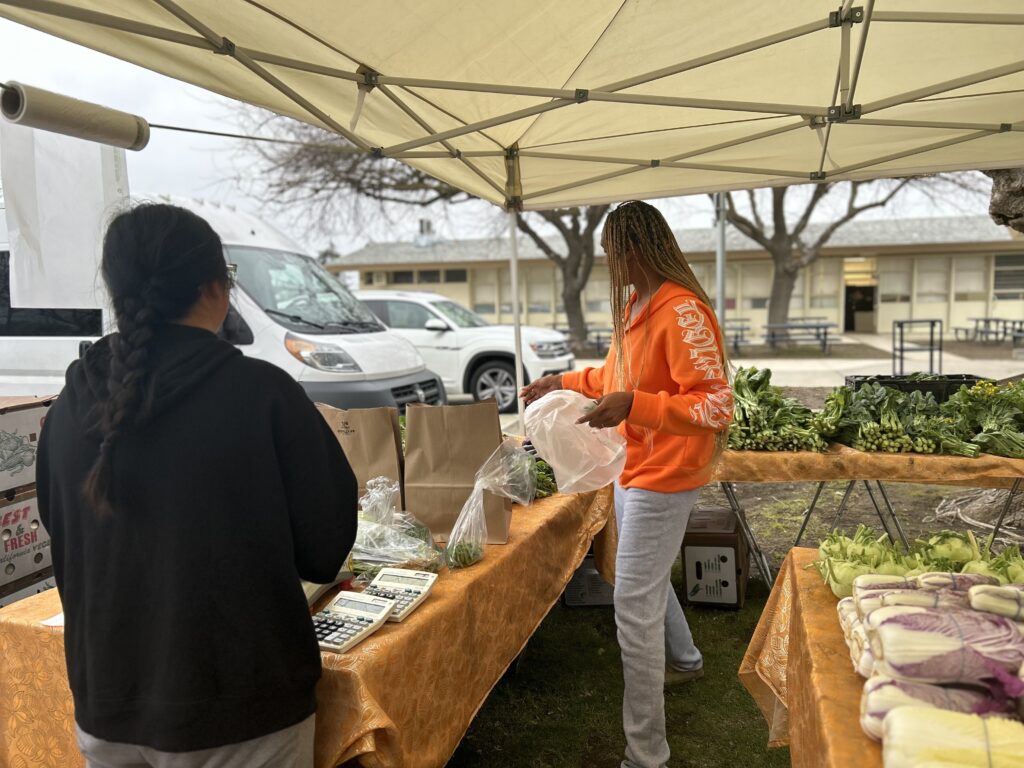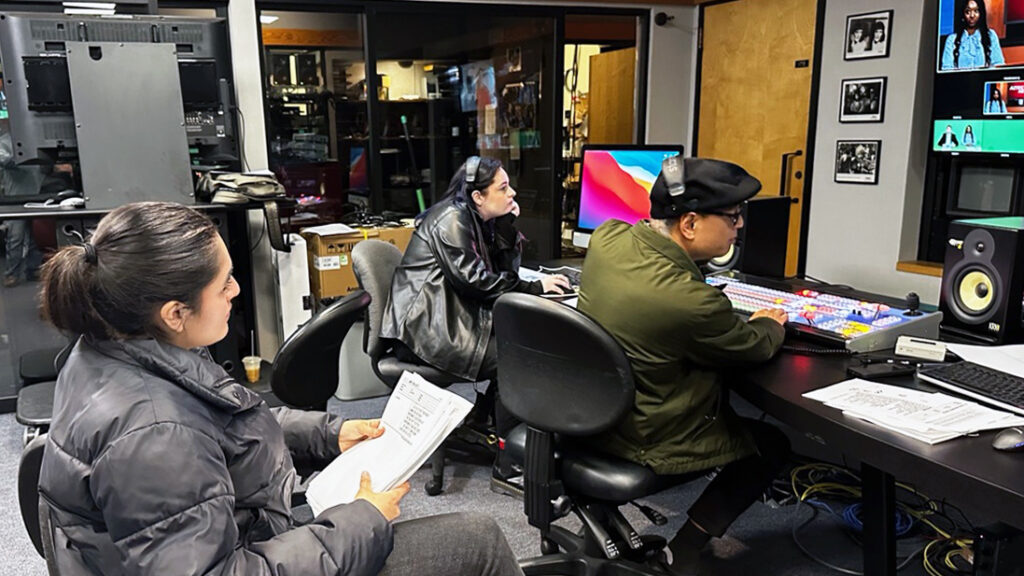
Chelsi Allen, a mother with children in a Fresno private school, buys farm-grown produce at a Fresno Unified farmers market. Allen saw the market while picking up her daughter from a basketball game at Fort Miller Middle School on February 5, 2024.
Credit: Lasherica Thornton / EdSource
When the end-of-school bell rang, groups of students, parents and community members headed for the on-campus farmers market displaying plump green vegetables, potted seedlings and even boxes of free food.
Reflecting the community’s diversity, signs in the booths advertised crops not often seen in mainstream grocery stores, such as chijimisai (a hybrid Asian green that’s packed with nutrients) and other items popular with Asian or Latino families, alongside the standard fare.
As adults bagged and paid for the produce or helped themselves to any free items, young children questioned the farmers about how much water or sunshine a plant needs.
Later, when after-school activities ended, more parents and their student athletes, many still wearing their game uniforms, joined the crowd in the schoolyard at Fort Miller Middle School in Fresno on Feb. 5 — one of a number of farmers markets being held on Fresno Unified campuses this year.
Fresno Unified contracted with Fresno Metro Ministry, a nonprofit organization, to bring farmers markets to schools and increase access to fresh, healthy and affordable food in neighborhoods where it’s not easy to come by.
Fresno Unified and Fresno Metro Ministry leaders say the partnership is important for students, families and the community. Here’s how:
Why start the program?
Much of Fresno is a food desert, lacking access to affordable, healthy food due to an absence of nearby grocery stores, or a food swamp with better access to junk food than nutritious food options, said Amanda Harvey, director of nutrition services with Fresno Unified.
Bringing farmers markets to schools within a food desert or swamp — which mostly exist in predominantly Black and brown neighborhoods — provides access to nutritious food.
Is this the first time Fresno Unified has put farmers markets on its campuses?
In the past, the district has hosted farmers markets sponsored and run through community partnerships, Harvey said, but the partnership with Fresno Metro Ministry is run with the school district.
The big difference is that through the new partnership, Fresno Unified students and staff will learn how to operate the markets, said Chris De León, the farm and gardens program manager with Fresno Metro Ministry.
Why partner with Fresno Metro Ministry?
Fresno Metro Ministry creates school and community gardens at locations throughout Fresno to educate the community about gardening and provides land access and other resources for beginning farmers and community members to grow fresh, local produce in food-insecure neighborhoods. De León said it was a “no-brainer” for the organization to partner with the school district to engage students and bring farmers to school campuses.
What’s sold at the markets?

The Fresno Unified partnership is funded, in part, through a grant from the California Department of Food and Agriculture that requires the farmers market to sell specialty crops, such as apricots, avocados, asparagus, beans, blueberries, broccoli, cabbage, carrots and other fruits and vegetables, as well as tree nuts, herbs and other plants.
Crops from different cultural groups, such as Latino and Southeast Asian farmers, can be offered, too. For instance, Casillas Farms and Siembra y Cosecha Farms, managed by Spanish-speaking farmers, and Xiong Farm Produce, which sold Chinese cauliflower, were at the Fort Miller market.
How does the program impact students?
The farmers markets are meant to be student-led.
Students learn how to seek out farmers, work with market vendors, organize, then promote the upcoming event and set up the market, Harvey said.
Students can even earn food safety and handling certifications, an experience Harvey called a “resume-builder.”
The farmers market itself highlights and promotes student clubs and district programs, especially activities related to agriculture.
Harvey said schools give students the autonomy to come up with ideas for the markets: “What do they want to see in their event?”

Eighth graders Lilly Blanco and Andrea Morgan (who managed a booth with herbal plants) pointed out to shoppers how enslaved Africans used herbs, a topic they’re exploring in their ethnic studies class. Aloe vera was used to treat burns and inflammation, and mullein could treat whooping cough, chronic bronchitis and congestion, Morgan said about the research she and her classmates conducted and published in pamphlets for the market.
The farmers market allows students to sell, feature or display products.
“They’ve been really excited planting their own herbs,” Morgan said.
Having students lead, plan and facilitate the events puts them at the forefront, gives them a voice and teaches them responsibility, said Yang Soua Fang, a farm and gardens project manager with Fresno Metro Ministry.
How is it beneficial for families?
While picking up her daughter from a basketball game at Fort Miller, Chelsi Allen expressed how convenient it was for her, a mother of five, to be able to shop while on campus.
“Being at the school setting,” Allen said, “I never thought about it. It just feels right to get some healthy foods and go home and cook.”
Allen, whose children attend Holy Cross Junior High, a private school in Fresno, said that what Fresno Unified is doing gives families affordable access to items needed for a balanced meal.
She pointed out the stark difference between the convenience of the school farmers market and a grocery store, where most people shop for specifics and may not seek out healthy food options that aren’t “in your face” like those at the farmers market.
“We get to serve our students every day,” said Harvey, the district’s nutrition services director, “but to be able to also bring nutritious meals to our adults in our community is huge.”
Will the school district do anything differently?
During the markets, Fresno Metro Ministry can offer food demonstrations to show families ways to serve the farm-grown produce. The food demos weren’t available at the Fort Miller market on Feb. 5, but Fresno Unified plans to do its part to promote nutritious food options to families.
Harvey said the district’s nutrition team can obtain participants’ input on introducing products into the food students eat in school.
“Is this something you’d be interested in seeing on school menus?” a survey asked farmers market attendants about kale.
“The more familiar students are with them, the more likely they are to ask for them at home,” she said. “‘I had this item at lunch; it was delicious. Let’s buy it.’”
What else do markets mean for families, school and community?
The farmers market also “puts a face to produce,” De León said.
“There’s so much: ‘What is this? How did you grow it? How do you cook it?’” he said.
He said he believes those conversations will build relationships between farmers and families, leading to more awareness and a better understanding of the importance of local farming.
Patricia Hubbard is a farmer who grows produce at Fresno Metro Ministry’s Yo’Ville Community Garden & Farm behind the Yosemite Village housing complex.
At the Fort Miller market, Hubbard sold starter plants of sweet peas and kale, including Ethiopian and Portuguese kale. The products are easy-to-grow plants that can hold kids’ interest in growing their own vegetables, Hubbard said.
“We need young people farming,” she said.
The farmers market can pique that interest while changing the narrative about farmworkers, Soua Fang said.
“There’s such a negative stereotype to being a farmworker or laborer, but yet their contribution to our society is so important for us: That’s how we can sustain ourselves,” he said. “But … it’s like we put them at the bottom of the pedestal.”
Connecting and engaging with farmers places value and respect in their craft, especially when they share the stories of how they overcome barriers to become farmers.
Are there more markets?
With plans for different schools to host markets on a monthly or quarterly basis, Fresno Unified and Fresno Metro Ministry hope to set up about 15 farmers markets on campuses this school year. In addition to the Fort Miller market, Phoenix Secondary Academy held a farmers market in the fall to launch the partnership, and a couple of markets have been held in collaboration with the Fresno High School Flea Market. For the rest of the school year, markets will be at:
- Fort Miller Middle School on the first Monday of each month. The March 4 market has been rescheduled for March 18.
- Fresno High School on the second Saturday of each month.
- McLane High School, which is still planning dates but has confirmed April 6 for its first market.
Some of the designated schools are located in the middle of food deserts or serve high numbers of students experiencing food insecurity, Soua Fang said.
At other Fresno Unified schools where there may be agricultural programs offering gardening and farming, Fresno Metro Ministry hopes to “fill the last little gap” by creating a culture around farmers markets. At the Fresno High Flea Market, De León said the organization adds healthy food access to an already thriving market “to connect that bridge from community to school, so it’s not so separate.”
Schools interested in hosting a farmers market should reach out to Fresno Metro Ministry.
To host a farmers market, schools can contact De León at chris@fresnometmin.org or Soua Fang at yang@fresnometmin.org.
Allen, the mother who attended the Fort Miller market in early February, said, “More schools should do this.”


